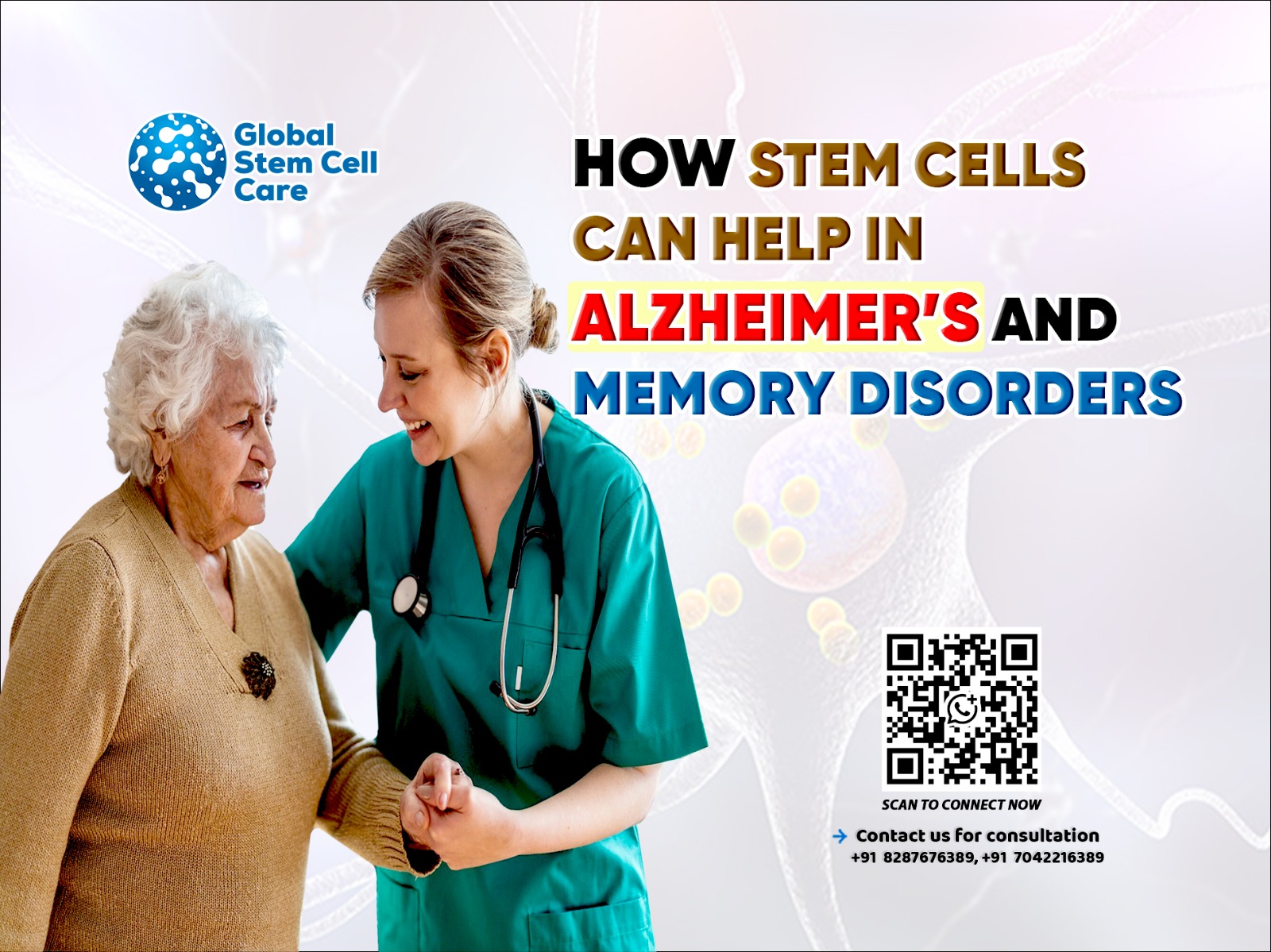Table of Contents
Summary: Millions of people suffer from Alzheimer’s and memory disorders, which leads to taking away patients’ independence and their families ‘ precious memories. Although undertaking traditional treatments can only slow down symptoms, they cannot repair brain damage. Stem cell therapy, a revolutionized approach in regenerative medicine, shows promise in restoring brain health and improving memory. This blog explores how stem cells may help patients with Alzheimer’s and memory-related disorders.
We know it is hard to watch a loved one struggle with memory loss, which can be heartbreaking. Alzheimer’s disease and related memory disorders don’t just affect the patient but also affect the families, too. Traditional treatments, like medications and cognitive therapies, provide limited relief and cannot stop the disease from progressing.
To treat this condition, researchers and doctors are exploring stem cell therapy as a new hope. By repairing and restoring damaged brain cells and supporting new cell or nerve growth in the brain, stem cells may help slow memory decline and enhance brain function. Let us understand how this breakthrough could change the future of Alzheimer’s care.
Understanding Alzheimer’s and Memory Disorders
Alzheimer’s is the most common type of dementia, which affects the brain by:
- Damaging nerve cells and disrupting communication between them.
- It can cause memory loss, confusion, and changes in behavior.
- Gradually worsening over time, which leads to dependence on families or caregivers.
What Is Stem Cell Therapy?
Stem cell therapy is a sophisticated form of regenerative medicine that employs the body’s own natural repair cells to replace or restore damaged tissues. Stem cells are special because they can be transformed into numerous other cells, for example, nerve cells, muscle cells, or blood cells.
With Alzheimer’s and memory disorders, stem cell therapy employs:
- Repairing or replacing lost or damaged brain cells.
- Repairing the neural circuits that govern thinking and memory.
- Providing for the brain’s natural capacity to heal.
The new modality is being researched around the world for its capacity not only to heal symptoms, but to stop the process of neurodegeneration.
Current Treatments & Their Limitations
Although the current treatments are focused on managing symptoms, which provide only temporary relief, they do not reverse the diseases:
- Taking medications that can only help temporarily to enhance memory or slow the decline.
- Undertaking cognitive therapies like brain exercise and memory training helps patients stay engaged.
- Lifestyle changes like a healthy diet, exercise, and social interaction can also support overall health.
However, these treatments cannot repair damaged brain nerves or regenerate lost neurons, which is where stem cell treatment brings new possibilities.
How Stem Cells Work in the Brain?
Stem cells possess special capabilities that render them hopeful in addressing memory disorders:
Neuron Regeneration: They are capable of differentiating into nerve cells, taking the place of those lost to Alzheimer’s.
Brain Network Repair: Stem cells could repair brain communication between brain cells, enhancing memory and cognition.
Inflammation Reduction: They assist in lowering brain inflammation, one of the primary drivers of Alzheimer’s development.
Brain Health Support: Stem cells secrete growth factors that keep and support current neurons.
Research and Clinical Trials on Stem Cells for Alzheimer’s
Across the globe, clinical trials are exploring the potential of stem cell therapy for curing Alzheimer’s. Initial findings are:
- Improved cognitive ability in a few patients.
- Memoricide is slowing down.
- Improved functional activity of the entire brain.
Even in India, studies are increasing, with specialized clinics performing regenerative treatment for neurological diseases. Even though these trials are ongoing, the initial results are a respite to Alzheimer stricken families.
Potential Benefits of Stem Cell Therapy for Alzheimer’s Patients
While stem cell therapy is not a cure, it could bring substantial benefits, as follows:
- Slowing the speed of memory loss and cognitive decline.
- Improving attention and concentration, which could reestablish more independence for a longer time.
- Increasing quality of life for patients as well as caregivers.
- As a potential long-term treatment basis in addition to symptom management.
The Bottom Line
Memory disorders and Alzheimer’s are two of the difficult issues confronted by medicine today, but stem cell therapy provides tomorrow’s hope. The prospect of curing diseases by fixing brain cells, lowering inflammation, and maintaining memory ability will have a large impact on future treatment of memory disorders and Alzheimer’s.
Global Stem Cell Care experts can give you the right guidance, details, and choices for stem cell therapy, particularly if you are looking at getting treated in India. Global Stem Cell Care experts assist patients and clients with identifying safe, state-of-the-art, and empathetic care.
Frequently Asked Questions (FAQs)
Q1. How safe is stem cell therapy for memory disorders?
Ans. The treatment is safe with few side effects when done by trained experts.
Q2. How long do results from stem cell therapy last?
Ans. Effects may differ, but improvement can be for months or longer, depending on the overall health of the patient.
Q3. Is stem cell therapy for Alzheimer’s available in India?
Ans. Yes, India is becoming a center of regenerative medicine, with consultancies such as Global Stem Cell Care providing professional consultation and assistance.
Q4. How does Global Stem Cell Care assist patients?
Ans. Global Stem Cell Care aids patients with precise diagnosis, treatment, and overall care for those who are considering stem cell therapy in India.
